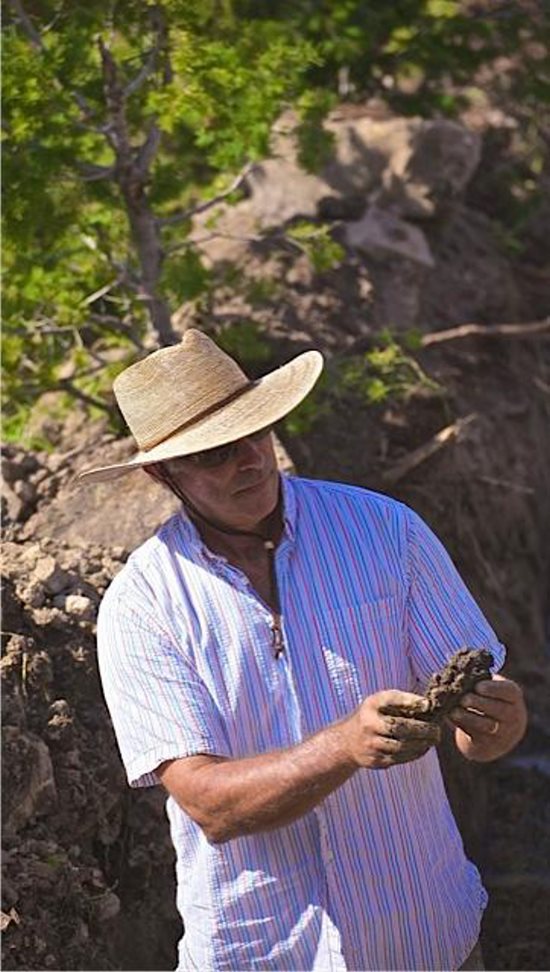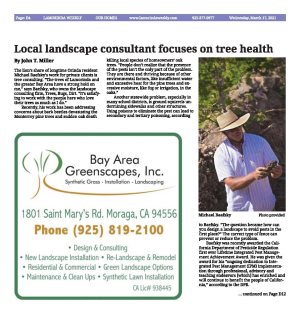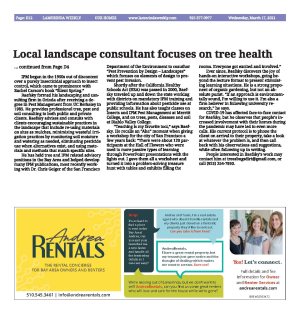| | Published March 17th, 2021
| Local landscape consultant focuses on tree health
| | | By John T. Miller |  | | Michael Baefsky Photo provided |
The lion's share of longtime Orinda resident Michael Baefsky's work for private clients is tree consulting. "The trees of Lamorinda and the greater Bay Area have a strong hold on me," says Baefsky, who owns the landscape consulting firm, Trees, Bugs, Dirt. "It's satisfying to work with the people here who love their trees as much as I do."
 Recently, his work has been addressing concerns about bark beetles devastating the Monterrey pine trees and sudden oak death killing local species of homeowners' oak trees. "People don't realize that the presence of the pests isn't the only part of the problem. They are there and thriving because of other environmental factors, like insufficient water and excessive heat for the pine trees and excessive moisture, like fog or irrigation, in the oaks."
Recently, his work has been addressing concerns about bark beetles devastating the Monterrey pine trees and sudden oak death killing local species of homeowners' oak trees. "People don't realize that the presence of the pests isn't the only part of the problem. They are there and thriving because of other environmental factors, like insufficient water and excessive heat for the pine trees and excessive moisture, like fog or irrigation, in the oaks."
 Another statewide problem, especially in many school districts, is ground squirrels undermining sidewalks and other structures. Using poisons to eliminate the pest can lead to secondary and tertiary poisoning, according to Baefsky. "The question became how can you design a landscape to avoid pests in the first place?" The correct type of fence can prevent or reduce the problem.
Another statewide problem, especially in many school districts, is ground squirrels undermining sidewalks and other structures. Using poisons to eliminate the pest can lead to secondary and tertiary poisoning, according to Baefsky. "The question became how can you design a landscape to avoid pests in the first place?" The correct type of fence can prevent or reduce the problem.
 Baefsky was recently awarded the California Department of Pesticide Regulation first ever Lifetime Integrated Pest Management Achievement Award. He was given the award for his "ongoing dedication to Integrated Pest Management (IPM) implementation through professional, advisory and teaching endeavors [which] has enriched and will continue to benefit the people of California," according to the DPR.
Baefsky was recently awarded the California Department of Pesticide Regulation first ever Lifetime Integrated Pest Management Achievement Award. He was given the award for his "ongoing dedication to Integrated Pest Management (IPM) implementation through professional, advisory and teaching endeavors [which] has enriched and will continue to benefit the people of California," according to the DPR.
 IPM began in the 1950s out of discontent over a purely insecticidal approach to insect control, which came to prominence with Rachel Carson's book "Silent Spring."
IPM began in the 1950s out of discontent over a purely insecticidal approach to insect control, which came to prominence with Rachel Carson's book "Silent Spring."
 Baefsky formed his landscaping and consulting firm in Orinda after receiving a degree in Pest Management from UC Berkeley in 1985. He provides professional tree, pest and soil consulting to both public and private clients. Baefsky advises and consults with clients encouraging sustainable practices in the landscape that include re-using materials on sites as mulches, minimizing wasteful irrigation practices by monitoring soil moisture and watering as needed, eliminating pesticide use when alternatives exist, and using materials and methods that match specific sites.
Baefsky formed his landscaping and consulting firm in Orinda after receiving a degree in Pest Management from UC Berkeley in 1985. He provides professional tree, pest and soil consulting to both public and private clients. Baefsky advises and consults with clients encouraging sustainable practices in the landscape that include re-using materials on sites as mulches, minimizing wasteful irrigation practices by monitoring soil moisture and watering as needed, eliminating pesticide use when alternatives exist, and using materials and methods that match specific sites.
 He has held tree and IPM related advisory positions in the Bay Area and helped develop many IPM publications, most recently working with Dr. Chris Geiger of the San Francisco Department of the Environment to coauthor "Pest Prevention by Design - Landscapes" which focuses on elements of design to prevent pest invasion.
He has held tree and IPM related advisory positions in the Bay Area and helped develop many IPM publications, most recently working with Dr. Chris Geiger of the San Francisco Department of the Environment to coauthor "Pest Prevention by Design - Landscapes" which focuses on elements of design to prevent pest invasion.
 Shortly after the California Healthy Schools Act (HSA) was passed in 2000, Baefsky traveled up and down the state working with districts on mandatory IPM training and providing information about pesticide use at public schools. He has also taught classes on Insects and IPM Pest Management at Merritt College, and on trees, pests, diseases and soil at Diablo Valley College.
Shortly after the California Healthy Schools Act (HSA) was passed in 2000, Baefsky traveled up and down the state working with districts on mandatory IPM training and providing information about pesticide use at public schools. He has also taught classes on Insects and IPM Pest Management at Merritt College, and on trees, pests, diseases and soil at Diablo Valley College.
 "Teaching is my favorite tool," says Baefsky. He recalls an "Aha" moment when giving a workshop for the city of San Francisco a few years back: "There were about 120 participants at the Hall of Flowers who were used to more passive types of learning through PowerPoint presentations with the lights out. I gave them all a worksheet and turned it into a problem-solving treasure hunt with tables and exhibits filling the rooms. Everyone got excited and involved."
"Teaching is my favorite tool," says Baefsky. He recalls an "Aha" moment when giving a workshop for the city of San Francisco a few years back: "There were about 120 participants at the Hall of Flowers who were used to more passive types of learning through PowerPoint presentations with the lights out. I gave them all a worksheet and turned it into a problem-solving treasure hunt with tables and exhibits filling the rooms. Everyone got excited and involved."
 Ever since, Baefsky discovers the joy of hands-on interactive workshops, going beyond the lecture format to present stimulating learning situations. He is a strong proponent of organic gardening, but not an absolute purist. "If an approach is environmentally sound, I'm willing to use it. I'm also a firm believer in following university research," he says.
Ever since, Baefsky discovers the joy of hands-on interactive workshops, going beyond the lecture format to present stimulating learning situations. He is a strong proponent of organic gardening, but not an absolute purist. "If an approach is environmentally sound, I'm willing to use it. I'm also a firm believer in following university research," he says.
 COVID-19 has affected face-to-face contact for Baefsky, but he observes that people's increased involvement with their homes during the pandemic may have led to even more calls. His current protocol is to phone the client on arrival to their property, take a look at whatever the problem is, and then call back with his observations and suggestions, while often following up in writing.
COVID-19 has affected face-to-face contact for Baefsky, but he observes that people's increased involvement with their homes during the pandemic may have led to even more calls. His current protocol is to phone the client on arrival to their property, take a look at whatever the problem is, and then call back with his observations and suggestions, while often following up in writing.
 People interested in Baefsky's work may contact him at treesbugsdirt@gmail.com, or call (925) 254-7950.
People interested in Baefsky's work may contact him at treesbugsdirt@gmail.com, or call (925) 254-7950. |
| | | | | | | | | | | | |




